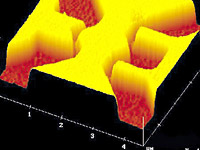| Nanotechnology |
|
||||||||||

Description Nanotechnology is the science of understanding the structure and behaviour of materials at the atomic or molecular level.
Through an understanding of how to manipulate atoms and molecules it is possible to create devices and machines with unique properties and applications. The power to control and exploit atomic structure provides the potential to dramatically transform the world around us. There are projects under way, for example, to develop atomic-size computer devices on silicon chips, or to build molecules that can sense particular bacteria or viruses, or catalyst powders that can use sunlight to control pollutants. Nanotechnology is emerging as a growth industry in Australia and internationally. This means that start-up companies and other organisations seeking to develop nanostructured devices will need to employ scientists who understand the behaviour of materials in nanostructured form and can also apply their knowledge to the successful commercialisation of products. As well as the many career options it offers, graduates will be equipped to obtain employment in areas accessible to traditional Bachelor of Science graduates. Studying Nanotechnology at UNSW At an undergraduate level, the Faculty of Science (www.science.unsw.edu.au) offers the Bachelor of Science (Nanotechnology) program. Higher degree study, either by coursework or research, will also be available to suitably qualified graduates.
|
|||||||||||

| Contacts | Library | myUNSW | WebCT |